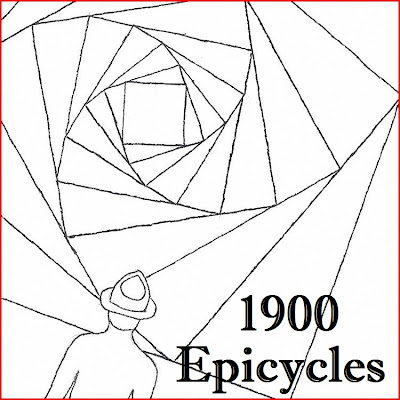A week ago, I released an-other EP (you can find it here). So - as I've done for the others - I thought I would type up a post with some more information about all of the songs.
---&---
"1900 Epicycles"
This is one of the oldest songs on the EP. I wrote this for FAWM 2011 and revised it extensively in November 2011. I'm pretty sure that the main melody was inspired by Nick Drake's "Know." I also snuck in a bit inspired by Edvard Grieg's Symphonic Dance, Op. 64. At the time I wrote this, I'd been listening to Jefferson Airplane's After Bathing at Baxter's, which had some effect. When I revised this, I added some different chords, and although they're not in the same order, I used the same chords that are in the Searchers' "When I Get Home," even including the key change.
---&---
"Burghley"
This was the first song I wrote for 50/90 in 2011. I named this after Lord Burghley by flipping through a book of quotes I have and picking one by him (though I don't remember it now). I'm really bad at titles. The electric piano part in the middle was written about five months after the 50/90 version.
---&---
"Murque"
This was the last song I wrote for 50/90 2011. In fact, I posted this on 30 September - the day before 50/90 ended.
---&---
"Island"
This was also a 50/90 song from 2011. When I first recorded this, it used all of the string instruments I had. One of the mandolin parts re-arranges the notes from some incidental music from Shaun the Sheep.
---&---
"Emerald Circles"
Yet an-other 50/90 song from 2011. I started writing the chord progression for this on mandolin and had always intended to record the final version on mandolin, but it just worked better on guitar.
---&---
"Ogle"
An-other song from FAWM 2011. I had only recently gotten multi-tracking software at the time I completed this, which is why it's simpler than some other songs. It's named after Ogle County.
---&---
"Snowy"
This was a 50/90 song in 2011, but I have demos from June 2011 that have this pretty much intact.
---&---
"Nail 5"
From 50/90 2011. I believe this was one of the first times I wrote two simultaneous parts.
---&---
"Chanson de l'ombre"
An-other from 50/90 2011. The chord progression is much older, at least from the end of 2010. At the time, I had thought it was inspired by the chords of the Zombies' "It's Alright with Me," but, just recently, I listened to some songs by the Easybeats, and it has more similarities with the chord progressions that they use. In particular "Sorry," which is one of my favourites.
---&---

